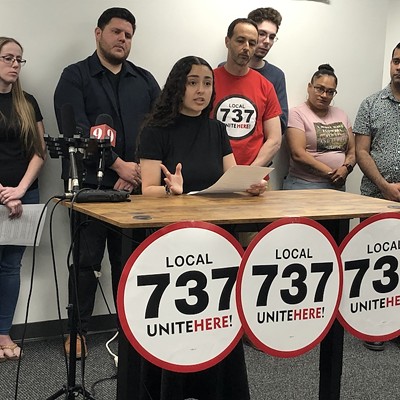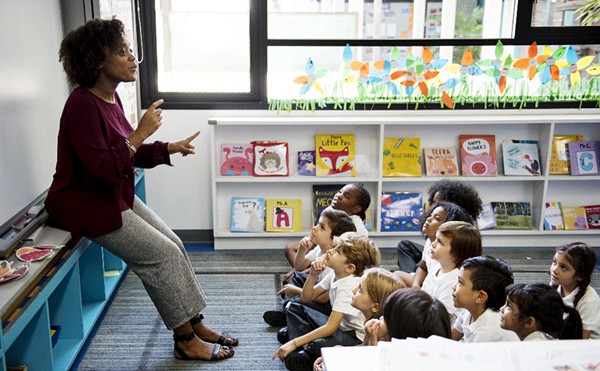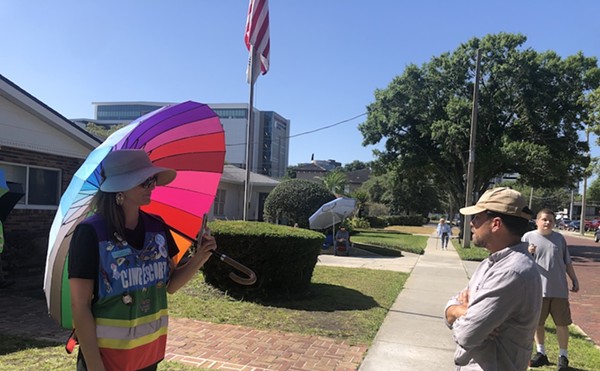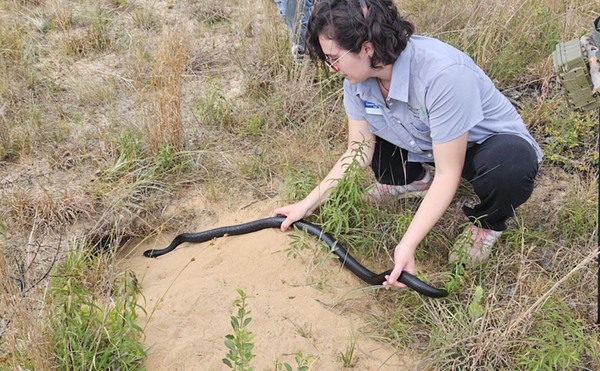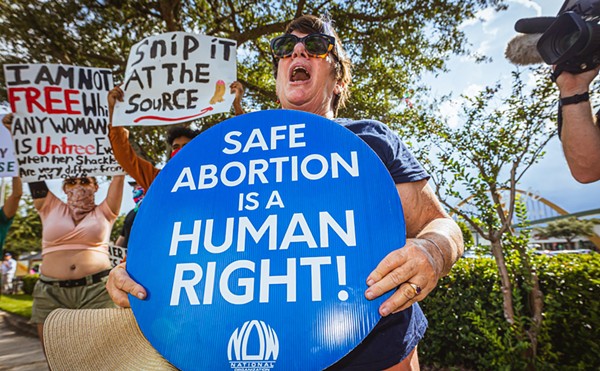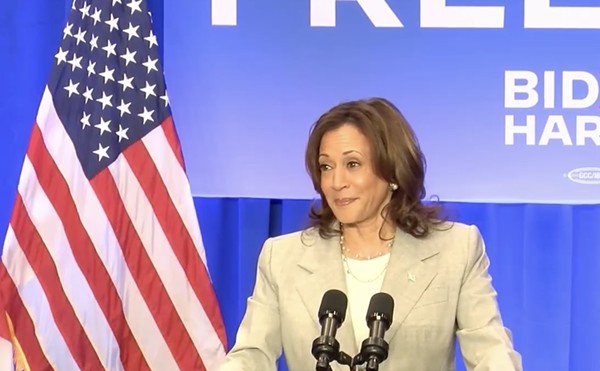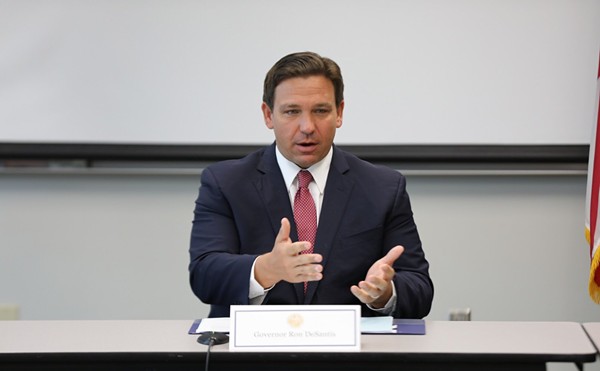It's a tax holiday in the Sunshine State, but judging from the numbers crackling from mouths downtown, you wouldn't know it. Saturday morning, July 29, is all about the numbers — more specifically, the taxes they denote and where those taxes come from. The FairTax crusade, brought to grass-roots popularity by talk radio superstar Neal Boortz, is in town to rally its supporters and the officials they elect.
But while the numbers may flow freely here — most notably that of the 23 percent sales tax proposed to replace the national income tax and ultimately abolish the IRS (and many of its tax loopholes) — one gets the sense this is about something more.
Two blocks from the barricades lining the City Hall block, a pancake breakfast (or "flapjacks for a flat tax," someone jokes) is launching the festivities at a bleary-eyed 7 a.m. at the First Presbyterian Church fellowship hall. Thirty-three-year-old Republican U.S. Senate hopeful Will McBride is here, stumping among the conservative voting base with a dimpled smile.
"Greetings from Missouri!" offers this morning's entertainment, a short, suit-wearing political singer named Jeff Parnell. "I've heard good things about you."
"Hopefully, some of them are true," McBride dutifully responds.
Another well-wisher approaches him with a FairTax question. "It's a no-brainer," he smirks. "But I'll have to admit that when I first heard about it …" and that smile returns.
Somebody else in line comments on the fact that McBride was unceremoniously cut off when he tried to discuss the FairTax on Bud Hedinger's WFLA 540-AM show, insinuating a conspiracy. McBride pretends not to understand.
In fact, most of the (almost exclusively pale) faces in attendance bear a conspiratorial smirk. From the movement's logo — a red circle-and-slash stamped over the letters "I," "R" and "S" — right down through its paranoid demonization of tax lobbyists in Washington and eventually to its hands-off-my-money individualism, this is a defensive, sometimes angry lot. They are the displeased faces of the grass-roots conservative movements that elected our current administration, the "values"-driven masses who want things more like they used to be, whatever that means.
"You don't have to fill out any forms," explains a middle-aged woman in a stretched-out "10 Reasons to Support the FairTax" T-shirt.
Onstage, Jeff Parnell adds a gloomy soundtrack to the gathering, strumming a call to revolution titled "Perhaps We Need a Tea Party Again."
Boortz enters the hall unannounced, but his anonymity is only momentary. Within 10 seconds, the entire room is standing and clapping, reverent beyond reverence. Digital cameras are snapping, candidates are scurrying into piggyback position and nobody is eating his pancakes. Boortz is bigger than food.
A self-styled "libertarian," Boortz sides with liberals on gay marriage and abortion, but still draws most of his fire, brimstone and listeners from the right (he airs locally on WDBO 580-AM, the chief organizers of today's event). He, along with Georgia congressman John Linder, co-authored The FairTax Book: Saying Goodbye to the Income Tax and IRS last year, sending it to the top of the New York Times best-seller list, almost in spite of its subject matter. Boortz's preface begins with a signature rib-nudge: "You've just picked up a book about taxes. What in the world were you thinking?" — a question he goes on to answer directly throughout the text, always in a conversational style, as if he were your slightly wiser buddy sitting next to you on a park bench.
"We don't want to get carried away with too many details here," he writes, "but it's important that you have as complete an understanding of tax compliance costs as possible, without turning you into a gaggle of boring accountants."
The details, in fact, are heartily obscured throughout the colloquial gab session; some simple graphs and number charts punctuate a largely rhetorical wash of down-home antipathy and money tucked in mattresses.
At the heart of it is a plan that transfers the onus of tax collection from the government to vendors. You keep your whole paycheck, only paying taxes when you buy new goods and services; used items are exempt. The individual thereby gains the freedom to choose where he or she wants to spend money — and pay taxes. Every household in America would receive a monthly "prebate" check to compensate for sales tax paid on necessities up to an amount set at the poverty level, based on the size of the family. Individuals, for example, would get $188 monthly, while a family with six kids would get $767. If that sounds like welfare to you, just keep your mouth shut.
Because we'll have more money to spend up front, the argument goes, the economy will "double in 15 years." And once freed of the "punishing" tax system, businesses previously forced overseas are bound to re-establish themselves in the good old U. S. of A. ("As soon as the FairTax Plan becomes law, these overseas corporate offices will be filled with packing boxes," the book speculates.)
Presented here, with Boortz as a witty liaison, this is Taxation for Dummies — an assumption that the FairTax.org people are well aware of.
"If there's any one challenge that we're struggling with, it's that," explains FairTax national spokesperson Ken Hoagland in a phone interview two days before the event. "We love the fact that Mr. Boortz is involved. But there are people who say, ‘Boortz is for it, I'm probably against it,' without looking at the substance of the proposal. It's just kind of a measure of how polarized we've become as a nation."
Hoagland eschews any political bias. "There is a very strong sentiment among the public that this is a test as to whether the voice of the American people has any meaning in our democracy. Here you have a tax proposal that is very good for the nation, very good for individual taxpayers across the political spectrum, but not good for tax lobbyists and not good for those in Congress who profit from manipulation of the tax code. We've got 75 economists who say that this is the best thing that could ever happen to the American economy," he says.
Of course, not everyone agrees. Critics of the FairTax say it could have unintended consequences: everything from encouraging a huge black-market economy to problems with collecting it to doubly taxing people who like to save, rather than spend.
"In a word: not very feasible," says Dr. Randall Holcombe, Professor of Economics at Florida State University. "Picture somebody who is just coming up on retirement. That person has paid income tax on his income his whole life. So the money he's accumulated for retirement is less, because he's paid income taxes on it his whole life. The way it is now, you can turn around and spend the money and the federal government doesn't tax it anymore. But, if we drop income tax and institute the FairTax, then everybody would be paying essentially a sales tax but no income tax. The person who is transferring into retirement essentially would be double-taxed."
And there are other problems, notes Holcombe. "The current income tax system, the bottom 50 percent of taxpayers, they actually get money back. They're net recipients of the income tax. That's because of the earned income tax credit. If you do away with the income tax system, and along with it the earned income tax credit, a lot of people are not going to be doing as well by the tax system as they are now."
Plus, notes Holcombe, there's the potential for double taxation if the FairTax were implemented and the 16th Amendment — which allows but doesn't require Congress to tax income — isn't repealed. It's a lot easier to amend the tax code than it is to repeal an amendment to the Constitution, meaning we could end up having two tax systems in place.
"There's definitely room to improve the tax system, and actually I think we've done that over the past couple of decades," says Holcombe.
By 10 a.m., the FairTax Rally is in full, heated swing. The police are reporting more than 2,000 in attendance, and the air temperature is hovering uncomfortably in the mid-90s. Somebody has painted his dog blue and printed H.R. 25 (the official FairTax moniker) on its sides, somebody's walking around wearing an American flag as a cape, and somebody else is hawking eight-hour DVDs detailing the treason conspiracies of Sept. 11. ("It's free," he says. "What do you have to lose?")
Sandy Stringfellow, a carpenter from Starke, is here to sell his own CD, featuring a song, "The FairTax Reveille," that Boortz has played on his show. He's been prepping for any chance to talk about it.
"It's a song about a guy who's raised as a child to have a good work ethic, and he goes to get his first job and there's these huge deductions from his paycheck. So he asks his employer, ‘Explain to me what's been going on,' and his employer says, ‘Sit down, I'll try to explain how life isn't fair,' and he goes on to talk about the IRS, and the government — bigger is not better, less is more — and you know, it's a charming way to introduce people to what went wrong and why we're in this mess in the first place."
Twenty feet away, Chris Adamik is catching heat for his posters on sticks. One reads "Let's all sign up for our own government checks. Do I get cheese with that?" and another says "The FairTax Book should be in the cooking section, because it will cook your goose!" From the moment he pulls them out, an encroaching mob of FairTax fans starts questioning him — at first politely, then not so much.
He's claiming that there are unreasonable assumptions in the book. The bullies, in varying shades of hypertension, are grilling him.
"I just don't like the fact that this is all going one-sided and no one seems to want to put the other side out there," he says, his WDBO shirt dampening fast. "There's huge flaws in the book. He's a good writer, and he's able to skim through it all, but for someone who actually reads the details, it's very obscured."
On stage, Hoagland has dropped his dour phone voice for a rally howl, sporting yellow slacks and spouting messages about the Boston Tea Party (a repeated point of FairTax reference; tea bags are even mailed in protest), about Ronald Reagan ("Stand tall!"), even about Jack Kennedy ("This is what you can do for your country!").
Boortz follows suit with invective about businesses that don't support the FairTax: "They'll know. Their stores will be empty. You won't go there." The crowd is silent when he speaks; you can practically see the wheels spinning in their heads, eyes staring off into space as if they're listening to their trusty radios.
[email protected]

